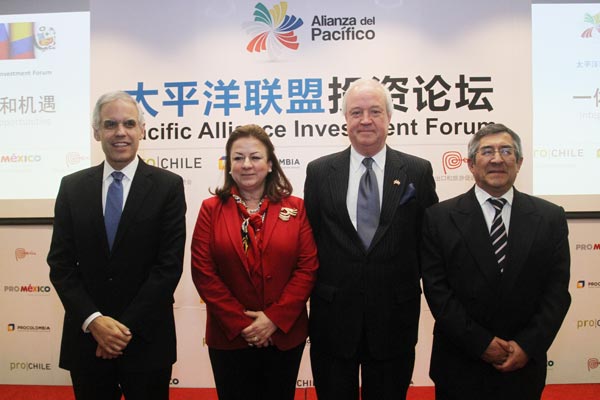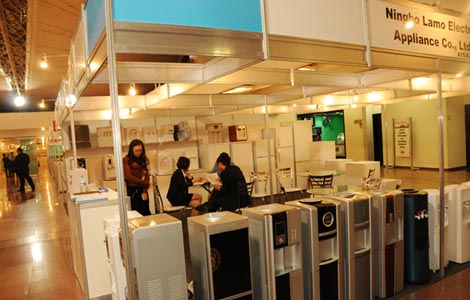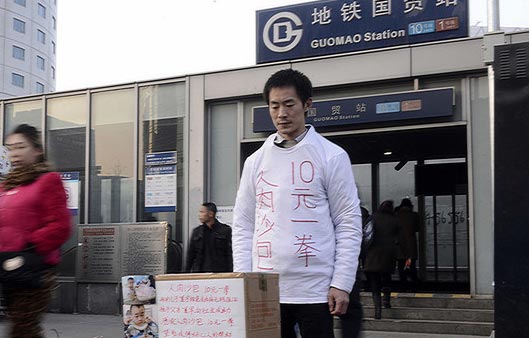Chile eyes Chinese investment
Updated: 2014-12-01 04:48
By Li Wenfang in Guangzhou(China Daily Latin America)
|
||||||||
 |
|
From left: Julian Ventura, ambassador of Mexico to China, Carmenza Jaramillo, ambassador of Columbia to China, Jorge Heine Lorenzen, ambassador of Chile to China and Juan Carlos Capuñay, ambassador of Peru to China, attend the Pacific Alliance Investment Forum held in Guangzhou on Nov 27. Photo provided to China Daily |
Chile is keen to attract Chinese investment into both its physical and digital infrastructure to enhance its connectivity and facilitate its development.
Jorge Heine, Chile's ambassador to China, made the remarks in an interview with China Daily.
The special geography of the South American country, featuring a long coastline, poses challenges to the country's connectivity. An underwater optical fiber broadband network is planned to link up the 1,000 kilometer southern half of the country, Heine said.
The tender for the project is scheduled to open next year and some Chinese companies have shown interest in bidding for it, he said.
Heine visited ZTE Corp, one of China's leading telecommunications vendors, in Shenzhen, Guangdong province, on Nov 26.
He also took a high-speed train from Shenzhen to Guangzhou, capital of Guangdong province.
Although a high-speed rail project is not foreseeable in Chile in the near future, Heine did not rule out such a project in the mid-run.
A number of shorter-range rail projects will become open for bidding in a few months and Heine considered Chinese construction companies as competitive in this field.
Meanwhile, Chinese investors are also welcome for joining the construction of a several billion-dollar cargo railway connecting Chile and Argentina, going through the Andes mountains.
As cars, trucks and container vehicles keep increasing, Chile needs more investment into its infrastructure, including roads, ports, tunnels and bridges, Heine said.
Energy, particularly renewable energy, including solar, wind and hydropower, makes another prioritized sector for enticing Chinese investment, he said.
Without crucial energy resources like oil and gas, the country pays a high energy bill, with the mining industry located in the north, which supplies major export items, as it's a heavy energy consumer.
The vast Atacama Desert, the world's driest desert, is blessed with rich source of solar power, he said.
Heine was in Guangzhou to attend the Pacific Alliance Investment Forum, established to promote investment in the four member countries, namely Chile, Mexico, Peru and Colombia.
The forum makes an important first step in promoting the opportunities in the alliance among businesses in this part of China, with Guangzhou being an industrial capital and Shenzhen highly IT-oriented, Heine said.
Julian Ventura, ambassador of Mexico to China, said great potential exists for cooperation between southern China and the alliance.
Guangdong accounts for one-ninth of the country's gross domestic product (GDP) and about 25 percent of the country's foreign trade and foreign direct investment (FDI), said Chen Qiuyan, chairman of Guangdong Sub-Council of China Council for the Promotion of International Trade.
Increasingly Guangdong businesses are interested in investing abroad. With the complementary nature in the economies of Guangdong and the Pacific Alliance and the drive for industrial transformation in the province, the prospect for cooperation is promising, Chen said.
He said his council would work to help turn the related projects into realities.
The Pacific Alliance has become a new prioritized destination for investment to Guangdong businesses, said Zhao Rong, vice-president of the Association of Promotion for Guangdong Economy and Investment.
Deng Zhihui, deputy director of the international business division of Guangzhou Automobile Group Motor Co, said his group started to sell passenger cars to Chile earlier this year and expects the sale to grow significantly in the future.
Shenzhen-based BYD Auto is considering setting up a branch in Peru, with such branches already operating in Chile, Mexico and Colombia, said Yi Liqun, a manager for automobile marketing of the overseas department of the company.
The Pacific Alliance was established to create a more deeply integrated economic area to foster growth, development, and competitiveness for its member countries, and to create more opportunities for trade, investment and cooperation with the Asia-Pacific region and the rest of the world.
Last year, the combined GDP of the member countries represented 38 percent of the total for Latin America and the Caribbean, which placed it as the 8th largest economy in the world.
The alliance has been the sixth highest receiver of FDI worldwide in the last decade.
liwenfang@chinadaily.com.cn
Most Viewed
Editor's Picks

|

|

|

|

|

|
Today's Top News
Oil price drop hits Latin America
Chile eyes Chinese investment
China's Xi seeks new outlook on foreign affairs
Rio 2016 games welcome Chinese companies
Chinese heavy machinery lifts Brazil
Brazilian meat exports to China to resume
Joint Satellite program helps save Brazil's forest
Beijing and Mexico reach together for stars
US Weekly

|

|
















